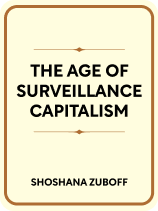

This article is an excerpt from the Shortform book guide to "The Age of Surveillance Capitalism" by Shoshana Zuboff. Shortform has the world's best summaries and analyses of books you should be reading.
Like this article? Sign up for a free trial here.
What is surveillance capitalism, according to Shoshana Zuboff? How does it operate in society?
In The Age of Surveillance Capitalism, Shoshana Zuboff explores the concept of “surveillance capitalism”—a term she created to describe the invasive and controlling data collection practices of big tech companies. She claims that companies like Google and Microsoft use it to maximize their profits.
Read on to learn more about surveillance capitalism and how it operates, according to Zuboff.
What Is Surveillance Capitalism?
So, what is surveillance capitalism? By learning about the concept and consequences of surveillance capitalism, you’ll be better equipped to protect your privacy and fight to protect the privacy of us all.
According to Shoshana Zuboff, surveillance capitalism is an emerging form of capitalism in which companies harvest data about our behavior, make predictions about our future behavior using that data, and sell those predictions for profit.
(Shortform note: Zuboff first invented the term “surveillance capitalism” in 2014. She used it in a paper exploring the future of Big Data and how we have both the power and responsibility to shape it how we want to. The paper was the precursor to many of the ideas discussed in The Age of Surveillance Capitalism.)
Zuboff explains that although most of us are aware that big tech companies are doing something to us, we aren’t capable of understanding what surveillance capitalism’s complexities are, including its implications or magnitude, because this is entirely unprecedented—we have no other event in history to compare it to.
(Shortform note: As the first event of its kind, the rise of surveillance capitalism is what Nassim Nicholas Taleb calls a “Black Swan.” In his book, The Black Swan, Taleb explains that Black Swans are fundamentally unpredictable events that have a major impact on humanity. He argues that the only way we can prepare for these events is by accepting that they’re unpredictable. Other examples of Black Swans are World Wars I and II, 9/11, and the 2008 financial crisis.)
How Does It Operate?
Now that you know what surveillance capitalism is, let’s explore how it operates in society. Zuboff tells us that surveillance capitalism consists of four main components: an underlying philosophy, products, a means of production, and a marketplace. Let’s discuss each component in more detail.
Component #1: An Underlying Philosophy
Zuboff explains that although people tend to see surveillance capitalism as a type of advanced technology that’s capable of learning uncomfortably specific details about us, it’s actually a philosophy that guides how companies use technology.
What is the idea underlying surveillance capitalism? The main philosophy is that serving people’s needs is less profitable and therefore less desirable than selling predictions about their future behavior. Through this lens, technology isn’t a means to make our lives better, but rather a means through which companies can better collect and control our data to maximize profits. In other words, in surveillance capitalism, the purpose of technology is to help companies collect more data, make more accurate predictions, and sell those predictions for more money.
(Shortform note: Zuboff says that the philosophy of surveillance capitalism is that selling behavioral predictions is more profitable than serving people’s needs. Why is this so concerning? In his book Basic Economics, Thomas Sowell explains that, in a free market economy, the promise of higher profits is supposed to incentivize businesses to produce goods and services that people want. If companies can earn higher profits without concerning themselves with the needs of consumers, the system breaks down and the people suffer.)
Component #2: Products
Zuboff says that in surveillance capitalism, the product that’s sold is predictions about your thoughts, actions, and emotions. Companies develop these predictions using data they collect about your behavior, both online and out in the real world. This includes everything from your online searches, text messages, and purchases to your facial expressions and attitudes.
(Shortform note: Zuboff makes it clear that large amounts of data make our behavior increasingly easy to anticipate, but just how predictable are humans in general? According to research, we’re extremely predictable. When researchers studied the way random cell phone users moved around, they found that users traveled in simple, regular patterns, regardless of age, gender, language, and other factors. These patterns were so regular that researchers could predict users’ whereabouts within the next hour with 93% accuracy.)
Component #3: Means of Production
What is surveillance capitalism’s method of production? According to Zuboff, companies like Google develop their predictions through machine intelligence. Machine intelligence feeds on behavioral data, constantly learning from what it takes in. The more data it collects about how people behave, the more accurately it can predict how people will behave in the future, and the more profitable its predictions become.
(Shortform note: Although Google’s use of machine learning to predict human behavior and sell those predictions for profit is unprecedented, machine learning has been around since the 1950s. In 1952, Arthur Samuel of IBM wrote a computer learning program that could improve its ability to play checkers with every game by studying the winning strategies.)
Component #4: Marketplace
Zuboff says the surveillance capitalism marketplace is where companies—the customers in this form of capitalism—trade for predictions about people’s behavior. While it was originally meant for advertisers, these days, any company that wants to take advantage of information about our future behaviors can participate by purchasing behavioral predictions from companies that gather user data.
(Shortform note: In her book, Zuboff paints the expansion of this marketplace to sectors other than advertising as a negative development that typically causes harm to society. However, in some cases, behavioral predictions can, and have, been used for good. For example, pet adoption agencies can use predictive analytics to determine which pets people are more likely to adopt. That way, they can focus their efforts on those pets that need more help being placed with families.)

———End of Preview———
Like what you just read? Read the rest of the world's best book summary and analysis of Shoshana Zuboff's "The Age of Surveillance Capitalism" at Shortform.
Here's what you'll find in our full The Age of Surveillance Capitalism summary:
- The methods big tech companies are using to watch you
- How surveillance capitalism can thrive despite opposition
- How to prevent it from destroying our freedom and democracy






